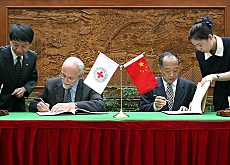
icrc takes root in the land of the dragon

The new regional office of the International Committee of the Red Cross (ICRC) in Beijing aims to improve ties with China and east Asia.
The Chinese economic boom is driving the development of the region as a whole. But despite the absence of conflict, tensions are palpable.
A large grey brick house stands in the middle of a diplomatic complex. It is flanked on one side by the commercial section of the United States embassy and on the other, beyond the compound wall, by the Xiu Shui market, one of the city’s busiest.
This anonymous building houses the regional office of the ICRC for east Asia (China, Mongolia and the two Koreas). The delegation opened its doors in September 2005.
“More than 90 per cent of the ICRC budget goes on emergency campaigns for conflict situations,” according to Denis Allistone, mission director.
“But we also have ongoing programmes, for example promoting
humanitarian law and its inclusion in military training programmes.”
In fact, this is the ICRC’s main activity in China, where the Red Cross has the rather curious nickname “Ten red”, a name which derives from the similarity between the cross and the Chinese character denoting the number ten.
Pressing need
“Previously we covered east Asia from Bangkok. But political and economic reasons, and the country’s huge capacity to help in humanitarian actions, made the need for a base in China more pressing,” added the director.
Negotiations on the new headquarters took almost two years
and were finally completed in April 2005. Since then the ICRC section has employed around 20 workers and operated on a budget of SFr6 million.
“In general we have good relations with the authorities,” remarked Allistone.
“We work alongside the armed forces and universities to ensure human rights norms are included in their training procedures. We also organise meetings and seminars. And we have the Geneva Conventions in support of the work we are doing.”
Part of this work is to deal with the legacy of past conflicts. Considerable numbers of people continue to fall victim to
anti-personnel mines planted during the Sino-Vietnamese war of 1979. In Yunnan province, in the southwest, the ICRC gives financial support to a new orthopaedic centre.
Tensions
Tensions are also simmering due to the unresolved status of Taiwan, North Korea’s nuclear activities and families divided by the closed border between the two Koreas.
“On this [latter] issue, we have offered to mediate between the two sides on several occasions. But the countries made it clear that they wanted to resolve the issue themselves. That said, if the two governments were to change their minds we would always be ready
and willing to help,” added Allistone.
The ICRC is still defining the scope of its activities – beyond spreading understanding of the principles of humanitarian law.
“We have to make ourselves better known outside official circles and the army,” stressed the mission director, who hopes to see financial support flow in from the business world.
swissinfo, Marzio Pescia in Beijing
The ICRC, which is headquartered in Geneva, has a presence in almost 80 countries and employs close to 12,000 workers.
The Beijing regional delegation, inaugurated in September 2005, has around 20 staff members. Its annual budget is SFr6 million ($5 million).

In compliance with the JTI standards
More: SWI swissinfo.ch certified by the Journalism Trust Initiative

























You can find an overview of ongoing debates with our journalists here . Please join us!
If you want to start a conversation about a topic raised in this article or want to report factual errors, email us at english@swissinfo.ch.